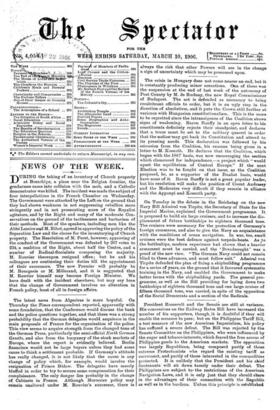The crisis in Hungary does not come nearer an end,
but it is constantly producing minor sensations. One of these was the suspension at the end of last week of the autonomy of Pest County by M. de Rudnay, the new Royal Commissioner of Budapest. The act is defended as necessary to bring recalcitrant officials to order, but it is an ugly step in the direction of absolutism, and it puts the Crown still further at variance with Hungarian constitutionalism. This is the more to be regretted- since the intransigence of the Coalition shows signs of weakening. Baron Banffy in an open letter to his constituents definitely rejects their standpoint, and declares that a truce must be set to the military quarrel in order that the nation'may get back its Constitution and attend to its pressing needs. This declaration was followed by his se*cession from the Coalition, his reasons • being given in a letter to M. Kossuth. He declares that the Coalition, which began with the 1867' basis, was now encouraging the section which clamoured for independence,—a project which "would upset the equilibrium of Central Europe." If the next Election was to be fought on that issue, as the Coalition proposed, be, as a supporter of the Dualist basis, would have none of it. Baron Banffy is not a great popular leader, but his resolution will make the position of Count Andrassy and the Moderates very difficult if they remain in alliance with the Apponyi and Kossuth party.










































